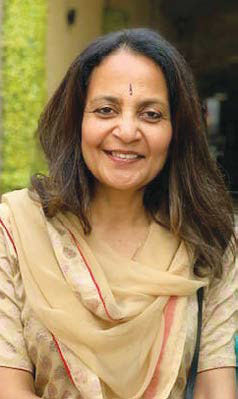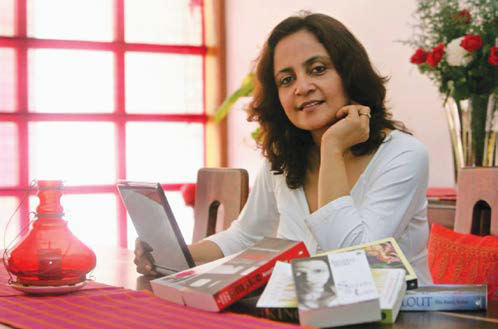Writing is much easier when you are abroad: Jaishree Misra

Dr. Aparna Ajith
“Nothing revives the past so completely as a smell that was once associated with it,” says, the renowned Russian- American novelist, Vladimir Nabokov.
Indians in foreign land express themselves best through the creation of literature. The avalanche of creative outpourings has traversed the borders and a galaxy of writers has seen, felt, and sensed the ethos of a diaspora. Jaishree Misra, the great-niece of the prominent Malayalam writer, Thakazhi Siva Sankara Pillai, is one eminent Indian novelist who rose to fame with her debut as well as her semi-autobiographical novel, Ancient Promises. Born in 1961 in a Malayali family in New Delhi, Jaishree Misra has lived the life of an expatriate and her characters do reflect those sensibilities. She holds a Master’s degree in English Literature from Kerala University and two Post Graduate diplomas. Her notable works are Accidents like Love and Marriage, Afterwards, Rani, Secret and Lies, Secret and Sins, A Scandalous Secret, and A House for Mr. Misra. Here’s Jaishree Misra in an online conversation with our interviewer, Dr. Aparna Ajith.
Your experience as a diasporic writer?
Writing is much easier when I live abroad. It’s a less distracting environment. There are many more demands on my time when I am in India. Here that I find, once I come inside the house, and close the door, people don’t drop in on me. Social expectations are a little more regimented. It is easier to find here a mental peace, balance and the equilibrium I need to write.
 Dilemmas, Challenges, problems, and prospects of a diaspora writer?
Dilemmas, Challenges, problems, and prospects of a diaspora writer?
It’s much easier to write about a place when you are removed from it. The picture gets crystallized into your mind and I think we step out of the frame to see the picture better. You get a better clarity of what is in your mind’s eye. I would recommend to anybody to get away from the place that you want to write about. It’s always much more efficient.
What comes quintessentially in diasporic writing according to you?
Sometimes practical things, archival things, zoom and so on, you can get hold of people you want to. Accessibility was less when I started writing twenty years back. My great uncle Thakazhi wrote about the fisher folk of Alappuzha. He used to work there as a lawyer. He knew their problems and he was representing the issues they had. He wrote Chemmeen many years after he had given up his work as a lawyer. It’s not about being diasporic it’s also about being removed from the place in terms of time. A little bit of distance, both physical and emotional can be of massive advantage in writing.
Where do you place your sense of belonging?
For me, belonging is becoming here in London. It’s becoming my home spiritually and mentally.
What about your characters and the novel setting?
What a writer wants to write is essentially his/her choice. My setting has always been India. Ancient Promises is the best example to quote. The subject that comes naturally remains from my home country. I would like to say about the Secret series of novels. The publisher was from here and he was so particular that the series should be about Indian women living here. Almost all of my characters have Indian origin.
Malayali diasporas and their love for their homeland?
Most of the Malayalis are very rooted in their home culture. The other day I came across a clip Malayalis of East London doing Thiruvathira Kali for the Queen’s Jubilee. They are in a mood to gather, celebrate and have food. Diasporas do a lot of things to promote culture warmly and gently.
Your fond memories about Kerala?
It’s difficult to think of memories as such because Kerala is very much a part of my life. I come very often to Kerala. I try to make my trips as frequent as possible. My mother lives there at Trivandrum. My uncle and aunt all are there and getting old too. I am always looking ahead to my next trip. I have got a small home at Trivandrum in the outskirts of Veli
The place does matter. Kerala reminds me of the smell of pazhamporis being made in the tea time, the fragrance of dosa, chutney, and whatnot. How it smells like, feels like, tastes like.
What a writer wants to write is essentially their choice.


